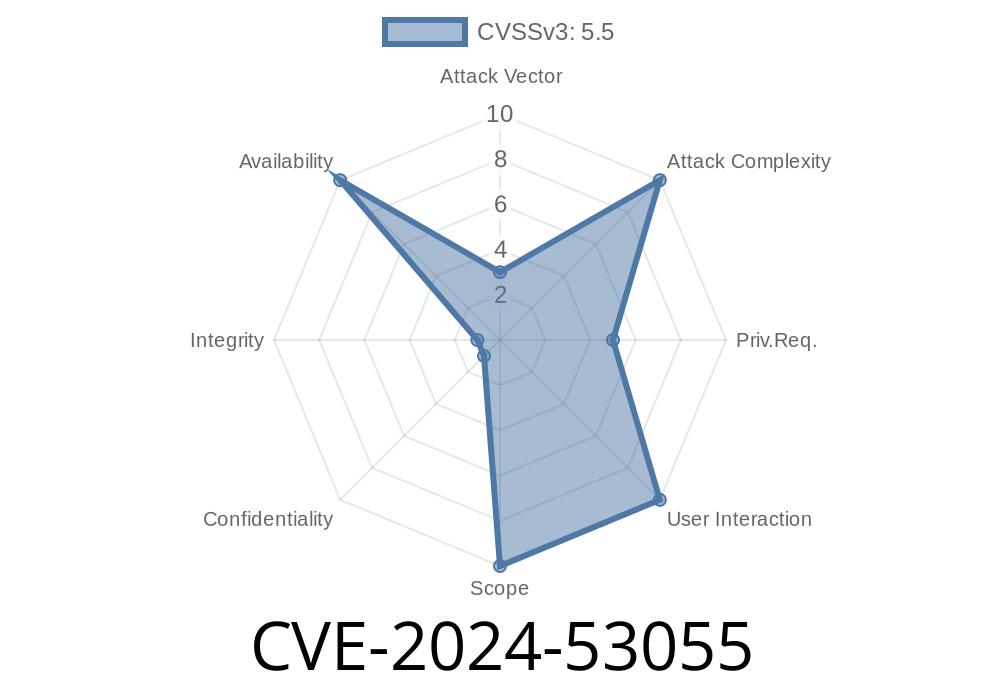Recently, a subtle but serious vulnerability was discovered in the Linux kernel’s iwlwifi module, specifically affecting Wi-Fi scanning in the 6 GHz band. This issue was tracked as CVE-2024-53055. It's a classic example of a programming oversight with surprisingly dangerous consequences — leading to potential Denial-of-Service (DoS) in systems using Intel wireless chips. Let’s break down what happened, how it can be exploited, and how it’s now fixed.
What is CVE-2024-53055?
The Linux kernel’s iwlwifi module is responsible for managing Intel wireless hardware. A bug in the mvm (Mac Virtual Machine) component caused the driver to enter an infinite loop during 6 GHz scanning when there were more than 255 Access Points (APs) detected during standard 2.4 GHz and 5 GHz scans. This was due to a variable type mismatch.
The loop counter used for iterating over APs was a u8 (unsigned 8-bit integer).
If more than 255 APs were present, the u8 counter could never reach the value stored in the u32, causing the loop to run forever.
Why Did This Happen?
In C, an u8 variable's maximum value is 255. If there are, for example, 300 APs detected, the loop variable will wrap around after reaching 255 and start again from , resulting in an endless loop.
Here’s a simplified version of the buggy code
u32 num_aps = get_number_of_aps();
u8 i;
for (i = ; i < num_aps; i++) {
// Process AP
}
If num_aps is greater than 255 (for example, 300), i will never reach 300, because as an 8-bit unsigned int, it wraps around after 255.
How Could This Be Exploited?
Attackers could intentionally broadcast a large number of fake Access Points (over 255), causing affected systems to hang during network scanning. Possible exploit scenarios:
Public spaces overcrowded with many Wi-Fi networks.
- Malicious actors with tools like MDK3 or similar to flood the airspace with bogus networks.
The system’s Wi-Fi scan process would get stuck, leading to high CPU usage, system slowdowns, or total freeze of the Wi-Fi subsystem.
The Patch: How Was It Fixed?
The solution was simple: change the type of the loop variable from u8 to u32 so it can count correctly up to the actual number of APs found.
Fixed Code Snippet
u32 num_aps = get_number_of_aps();
u32 i; // FIX: was u8 before
for (i = ; i < num_aps; i++) {
// Process AP
}
Additionally, the scope of the loop variable was reduced for clarity and safety.
Limits imposed elsewhere: The scan result list is capped (typically at 100).
- Each AP has a limit on RNR entries, bound by frame size (max about 372,000, well within a u32).
Kernel Patch:
iwlwifi: mvm: fix 6 GHz scan construction
CVE Record:
Simple Proof of Concept (PoC)
Setting up more than 255 unique fake Wi-Fi SSIDs within scanning range of a vulnerable device is enough to trigger this bug. A PoC can be constructed using tools such as MDK3 or wifiphisher. Sample steps:
mdk3 wlanmon b -f ssid_list.txt
# Where ssid_list.txt contains 300+ unique SSID entries
Then, initiate a Wi-Fi scan on the target device running the vulnerable iwlwifi driver; the scan process may never complete.
Mitigation and Update
If you use Linux on a laptop with an Intel Wi-Fi chip, update your kernel immediately, or apply the patch if you build your own. Major distributions have already shipped fixes in recent kernel updates.
Conclusion
CVE-2024-53055 is a reminder that small data type mismatches can have outsized operational and security implications in complex software like the Linux kernel. Thanks to keen eyes in the open source community, this bug was quickly squashed. Always keep your systems updated!
For more technical details and ongoing updates
- Linux Kernel Git Commit
- Intel Wireless Linux GitHub
- CVE Record (search: CVE-2024-53055)
Timeline
Published on: 11/19/2024 18:15:25 UTC
Last modified on: 11/22/2024 17:18:33 UTC
